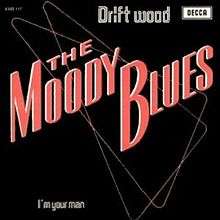Driftwood (Moody Blues song)
"Driftwood" is a 1978 single by the English progressive rock band the Moody Blues. It was the second single released from the album Octave, after "Steppin' in a Slide Zone". Written by Justin Hayward, "Driftwood" is a slow love ballad, in a similar manner to "Nights in White Satin" and "Never Comes the Day."
| "Driftwood" | ||||
|---|---|---|---|---|
 | ||||
| Single by The Moody Blues | ||||
| from the album Octave | ||||
| B-side | "I'm Your Man" | |||
| Released | 6 October 1978 | |||
| Recorded | January - April 1978 | |||
| Genre | Rock | |||
| Length | 5:02 (Album version) 3:57 (Single version) | |||
| Label | Decca | |||
| Songwriter(s) | Justin Hayward | |||
| Producer(s) | Tony Clarke | |||
| The Moody Blues singles chronology | ||||
| ||||
Billboard Magazine described "Driftwood" as a "lush romantic ballad."[1]
"Driftwood" was also the final single to feature keyboardist Mike Pinder, who left the band shortly before the completion of Octave for personal reasons. He would later be replaced by former Yes keyboardist Patrick Moraz.
Shortly after release, a promotional video was recorded for "Driftwood." The video features Patrick Moraz on the keyboards, although Mike Pinder is playing the keyboards in the actual recording. The song also includes an alto saxophone which is played by session musician R.A. Martin, although Ray Thomas is depicted playing the alto saxophone in the video.
Personnel
- Justin Hayward: vocals, acoustic guitar, electric guitar
- John Lodge: bass guitar
- Mike Pinder: keyboards
- Ray Thomas: tambourine
- Graeme Edge: drums, percussion
Additional personnel
- R.A. Martin: horns, alto saxophone
Chart success
The record spent seven weeks on the U.S. Billboard charts and peaked at No. 59.[2] It also reached No. 38 on the Adult Contemporary charts.[3]
References
- "Top Single Picks" (PDF). Billboard. September 30, 1978. p. 90. Retrieved 2020-07-09.
- http://www.billboard.com/artist/300750/the-moody-blues/chart?page=1&f=379, retrieved April 8, 2017
- Whitburn, Joel (1993). Top Adult Contemporary: 1961–1993. Record Research. p. 167.